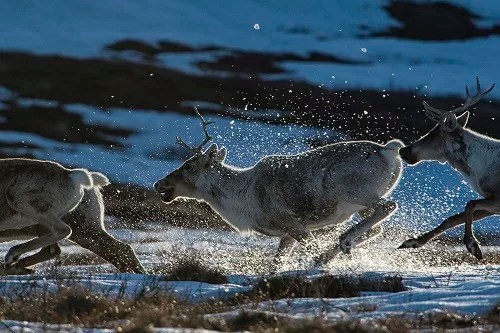When photojournalist and conservationist Peter Mather set out on his expedition to north western Canada with his partner Marty O’Brien he was preparing himself for a serious challenge. What he was actually up against though was far more daunting than he ever imagined. We spoke to Peter about his story, ‘In Pursuit’ and how his passion for adventure and the conservation of the Porcupine Caribou kept him going through the most intense physical and mental obstacles.

Having grown up in Yukon, northwestern Canada, I had heard a lot about the Porcupine caribou that lived there. They undertake the longest mammal migration on the planet, moving together through the cold, white landscape, travelling in long lines of thousands. Anyone who’s seen it, says it’s something they wouldn’t easily forget. I had heard a lot of stories that really built my interest around the caribou and I wanted to see them for myself, however, all my expedition experience up until this point consisted of month long canoe trips, in the height of summer. This was the first winter trip I had ever done. Attempting an expedition in a remote corner of north western Canada would be a challenging new experience. And, so it proved.
Every year, 200,000 Porcupine caribou migrate through the crow flats of north western Canada across to their calving grounds in Alaska’s arctic refuge. As a conservation and wildlife photographer, my main aim was to bring attention to the damage that is being done to these calving grounds due to the vast amounts of oil and gas development. In order to highlight the impact of industry in the area, my expedition partner and I, Marty, were looking to get a never before seen photo of the caribou on their migration. We wanted to demonstrate the scale of the caribou herd and the teamwork they show when migrating through winter.
After 3 years of preparation, we set off on our photography expedition on the 25th of April. We expected to be dropped off at Margaret lake where we would be able to station ourselves at base camp ready for the annual migration. But it all went wrong. In the end, due to faults with the plane, we were dropped off by a small, isolated lake 120km from our intended destination. We were left with the task of a 120km cross county expedition with 700lbs of equipment. It would prove to be the most agonising physical and emotional journey of our lives.
The issue for us was time. Without being properly prepared for a cross country skiing trip and with 700lbs of equipment there was a question over whether we would be too slow and miss the migration completely. Despite out worries, the start of our journey proved to be especially productive but unfortunately, this was short lived. What followed was 2 long days of slugging through soft, slushy snow. Over the course of 12 hours of skiing we had covered just 10 kilometres, giving us painful, swollen blisters which forced us to rest for a full day.

It wasn’t long though, before we realised that skiing overnight might be our best option. Changing to a night time schedule, we would be able to catch the cold night crust, meaning we didn’t sink everytime we took a step. This enabled us to consistently cover 10km each night, the same distance we had previously managed over two full days.
As we skied alongside each other under the nights dark blue sky I started to relish the environment and sense of adventure which has always motivated me for expeditions like these. We were travelling the same route that the Gwhich’in First Nations people had travelled centuries before us and it made me feel a kinship to them.
It was on the 10th day of our expedition that we heard the howls of the wolves in the forest ahead. This was the sign we had been waiting for to let us know the caribou were near. It was a feeling of blessed relief. But that relief was was quickly replaced by disappointment when we learned from our caribou biologist, (who was tracking the caribou remotely), that the caribou were still 150 kilometres away. We felt like all that we had gone through was for nothing – we would have made it to the caribou anyway. The real disappointment though came with a change in weather which resulted in a temperature increase of 40 degrees (farenheit). When the caribou finally passed through, they did so in groups of 50 grazing on grass not as 200,000 moving in a line through a cold, white landscape as we had hoped. After 3 years of preparation and an arduous cross-country ski expedition, the never before seen photo was still, never before seen. We didn’t get it.
Whilst the failure in capturing the perfect photograph was disappointing, I know that failure is inevitable in what I do. I know that you have to put the work in, in order to be successful and that if you do put the work in you get the rewards in the end. The motivation for the perfect photograph remains as strong as ever. What is most important though is that the 200,000 strong Porcupine caribou carry on migrating through these lands until long after I am still doing expeditions.

To read more about Peter Mather’s story, click here.











